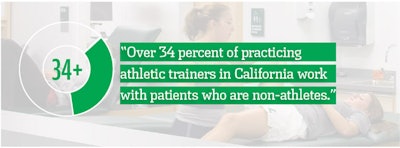![[Graphic courtesy of the National Athletic Trainers' Association]](https://img.athleticbusiness.com/files/base/abmedia/all/image/2018/05/ab.safetysec518_feat.png?auto=format%2Ccompress&q=70&w=400)
California remains the only state where the healthcare profession of athletic training has zero regulation. In California, anyone can say they're an athletic trainer, and even scarier — act as one. Qualified athletic trainers are healthcare professionals who prevent injuries, provide injury evaluation and assessment, offer emergency care, and treat and rehabilitate injuries and illnesses sustained by athletes and other working professionals.
 Jason Bennett is president of the California Athletic Trainers’ Association and director of the accredited master’s degree program in athletic training at Chapman University.
Jason Bennett is president of the California Athletic Trainers’ Association and director of the accredited master’s degree program in athletic training at Chapman University.
Log in to view the full article
California remains the only state where the healthcare profession of athletic training has zero regulation. In California, anyone can say they're an athletic trainer, and even scarier — act as one. Qualified athletic trainers are healthcare professionals who prevent injuries, provide injury evaluation and assessment, offer emergency care, and treat and rehabilitate injuries and illnesses sustained by athletes and other working professionals.
 Jason Bennett is president of the California Athletic Trainers’ Association and director of the accredited master’s degree program in athletic training at Chapman University.
Jason Bennett is president of the California Athletic Trainers’ Association and director of the accredited master’s degree program in athletic training at Chapman University.
The need for licensing of athletic trainers is a public health and safety issue. Every other state in the country, including the District of Columbia, regulates athletic trainers. Moreover, the University of Connecticut's Korey Stringer Institute tracked best practices for preventing sudden death in high school athletes across all 50 states, and only Colorado was worse than California at implementing these practices.
Healthcare professionals support Assembly Bill 3110, legislation introduced by Assemblyman Kevin Mullin (D-South San Francisco) that would require licensure, while also defining a scope of practice for athletic trainers. The American Medical Society for Sports Medicine, the American Orthopedic Society for Sports Medicine, the California Orthopedic Association, and the Osteopathic Physicians and Surgeons of California all support AB 3110. In fact, the NCAA, the National Federation of State High School Associations, the California Interscholastic Federation and more than 40 medical groups and youth safety advocacy organizations support this bill. Why? Here are four reasons:
1. Title protection is not enough
Title protection does not specify scope of practice, work qualifications or practice standards. Licensing is the only way to define a scope of athletic training practice and to enable a disciplinary process for athletic trainers practicing outside of their scope of practice. In the absence of a statutorily defined scope of practice, both practitioners and employers are at risk because athletic training in California currently operates in a legal gray area.
There is evidence of athletic trainers who have lost their license to practice in other states and come to California to practice. Licensure would create a board to investigate and, as necessary, discipline or otherwise sanction individuals who have committed harm to the public.
In addition, an increasing number of states require that out-of-state athletic trainers traveling with their teams be licensed in their home state. The Assembly Committee on Arts examined this issue in 2017 and found that 14 states do not accept Board of Certification documentation or title protection for athletic trainers traveling with their teams into those states. Since then, Georgia has added licensure requirements for visiting athletic trainers, and New York has proposed the same. Athletic trainers without licensure are breaking the law by traveling to these states and performing their job duties. Licensure solves the problem on multiple fronts by providing a scope of practice, protecting patient safety, and limiting liability for both employers and practicing athletic trainers.

2. Defining a scope of practice
AB 3110 would mandate that an athletic trainer's scope of practice be consistent with educational accreditation content standards, including risk management, injury and illness prevention, clinical evaluation and assessment of an injury or condition, immediate care of an injury or condition, and rehabilitation and reconditioning from an injury.
Defining a scope of practice also ensures that athletic trainers work under the direction of a physician, resulting in optimum care, diagnosis and treatment plans. Some athletic trainers throughout California currently work without physician oversight because there is no statutory mandate to ensure compliance. AB 3110 requires athletic trainers to refer to another licensed healthcare provider when the management of an injury or condition does not fall within the practice of athletic training. This is a critical, commonly overlooked factor in prioritizing the safety of patients.
3. ATs work with a variety of patients
It's important to remember that AB 3110 doesn't just affect athlete healthcare. Over 34 percent of practicing athletic trainers in California work with patients who are non-athletes. This includes patients in the military, performing arts, industrial and corporate settings, as well as in outpatient rehabilitation clinics. These varied employment settings are consistent with the education that athletic training candidates receive, including clinical rotation experiences while in school working with a diverse patient population.
The only way for someone to become a certified athletic trainer is to graduate from an accredited program, of which there are 14 in California, including seven at Cal State schools. As part of an accredited athletic training program, students must have clinical experiences with a variety of patients, including the traditional athlete population and the aforementioned non-athlete populations, as well as a variety of conditions other than orthopedics (primary care, internal medicine and dermatology, to name a few). Many are not aware that 34 percent of practicing athletic trainers in California deal with populations other than athletes.
4. There is NO cost to the state
AB 3110 specifies that the California Athletic Trainers' Association, not the state, would provide the startup costs associated with either a new licensure board or an existing board in order to regulate athletic trainers. This ensures that there is no cost to the state for licensing athletic trainers.
How you can help
If you're a California resident or business owner and concerned about this issue, please contact Governor Jerry Brown, your assemblyperson and key committee members and ask them to support AB 3110: http://bit.ly/SupportAB3110. Parents and guardians should also ask their children's schools if they have certified athletic trainers on staff, and to verify their athletic training credentials on the Board of Certification's website: www.bocatc.org/public-protection. For more information about this issue, visit the California Athletic Trainers' Association website at ca-at.org.
This article originally appeared in the May 2018 issue of Athletic Business with the title "The need for athletic trainer regulation in California." Athletic Business is a free magazine for professionals in the athletic, fitness and recreation industry. Click here to subscribe.




































